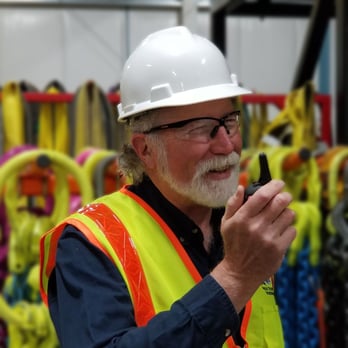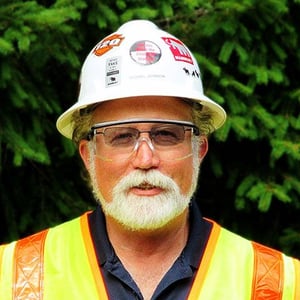ITI is the world’s leading crane, rigging, and load handling training provider in large part because of the unique backgrounds and experience of its team members. Don’t believe me? Recently, I had the opportunity to sit down with Michael Johnson, Instructor at ITI, to talk about his experience in the industry, travels for training, and why safety is something that everyone should be aware of in their daily activity.
Amanda Henry: What is your educational background?
Michael Johnson: After I graduated high school I spent a couple of years in a Pre-Engineering program at a community college in Illinois back in 1973 and 1974. Yes... I'm old. Most of my education is technical from my time in the Navy, working on computers, sonar operations, shipboard operations, and fire control systems. I did study a little bit of Psychology and Sociology throughout the years, during my Navy time.
AH: So, what made you want to go into the Navy and heavy industry?
MJ: I've always had an interest in mechanical stuff. I worked in construction a little bit before I joined the Navy for a couple of years. That’s kind of where life took me. I like getting my hands dirty and I like working on things. So, it just kind of worked out that way. I like to break things and fix things.
AH: Can you tell me about your experience being a trainer in the Navy?
MJ: Yeah. Well, the military is all about training. I advanced quickly to get into leadership positions and a part of leadership is training people. So, most of my career I had younger people that I had to train in the shipboard jobs that we did. I was a Damage Control Trainer on board several ships, so we had to teach firefighting, how to keep ships from sinking, and things like that. I was a technical school teacher for three years and actually wound up running the technical training office that had 100 instructors and 600 students. So, you know, that was a pretty big operation, pretty big training center. I trained everything from electronics to, interestingly enough, alcoholism and substance abuse. That’s something that I don't tell too many folks. Teaching them how to stay out of it, not getting into it.
AH: What made you decide to join ITI?
MJ: Well, I didn't decide to join ITI. In fact, once I retired from the Navy, I wasn't going to do anything professionally anymore. I got out of the hospital with congestive heart failure and I was looking for something to keep myself busy. Everything from county maintenance to driving a truck. While exploring Monster for a couple of days, a pop-up came up and said, “Hey, why don't you look at ITI?” And two times I dismissed it. That isn't the type of thing I wanted to do. On the third day, I figured God was trying to tell me something. So, I sent my resume back through Monster and got a phone call about 15 minutes later. It kind of confirmed that there was something in those three pop-ups that was leading me down the path. I had an interview the next day and started on that following Monday. That was a little over seven years ago. It's been an exciting ride and I think I'm supposed to be here doing something and nobody's told me to go home yet.
AH: Where have you traveled during your time as an instructor for ITI?
MJ: All over North America. Everywhere from Puerto Rico, Texas, Fort McMurray, Fairbanks, AK, both coasts, and places in between. I go where they send me.
AH: Where's your favorite place to go for training?
MJ: The Mojave Desert, and Rio Tinto, I kind of like those guys down there. There's a few other places I go on a regular basis. I try to find the good in every place I go. What I really appreciate about this job and the work that I do is I get to go where people are being functional, trying to learn things, and do things right. So, it gives me a positive outlook and helps me contribute to them doing better at their jobs.
AH: Is there anywhere that you hope to travel while you're still with ITI?
MJ: Maybe someday North Dakota. I haven’t been there. But, I've covered a good share of all the rest of the states. Antarctica would be important. I haven't been there. You know, it's the one continent I haven't been to through ITI or the Navy. Joe Kuzar and I fought over the one contract we almost had. Frankly, my wife wouldn't like me going someplace like Antarctica. She doesn't like me to be too far away from good medical care.
AH: Is there anything that you hope to accomplish during your career in this industry?
MJ: I believe I've already accomplished it. My goal is to keep people safe and make them better at doing their jobs. That's probably the biggest part of it, I get a lot of satisfaction out of doing that. I don't go into any place being very comfortable that I can just walk in and teach something. My goal is always for them to understand what I’m teaching and for them to come out the other side better than they were when they went in. Suddenly I'm really there for them. It’s not enough to satisfy my goals, but for them to complete theirs. Over the years, as far as I can figure out, I've been reasonably successful.
AH: Have you been able to see people that you've trained, put what you taught them into play? Does that give you satisfaction?
MJ: Oh, definitely. It's fun to get people to open their eyes a little bit, find something that they didn't know early on in the class because most of the people we teach have some years of experience. We don't teach a lot of people that are brand new, but if they can come out the other end and say, “Man, you taught me something I didn't know,” or “I didn't realize how I was using a tool probably wasn't the best way.”
I think that's probably one of the biggest things that ITI brings to the table. We give people the knowledge they need to do things maybe a little bit better, and a little bit safer than they were doing it previously. They're not going to remember all of it, but if they get one or two little nuggets that's going to make them think about what they're doing a little bit more. If they would just slow down and take things step by step. Follow some simple protocols for being safe and it's things that they can put forth in every activity in their lives. It's not just cranes and rigging, you know, we teach things that people can do every day. How often do you walk around your car?
AH: Like do a full circle? Maybe less than once a week.
MJ: You should do it every time. Inspection should be a part of your life. What's the first thing you do when you walk in the door at the office?
AH: Look around and try to be aware of what’s going on.
MJ: It takes just a few moments to take a sweep and say, “Is there anything in there that's going to be a hazard?” And we should do that on a regular basis. We need to make safety a part of our normal routine. We all make safety-based decisions over, and over, and over again. What do you do when you sit down at your desk? You take a look around to make sure everything is in its place. We all have a routine. I believe that we should all look around a bit more.




COMMENTS